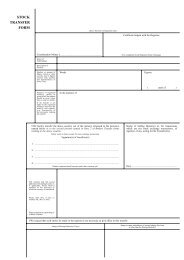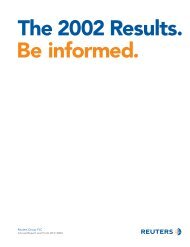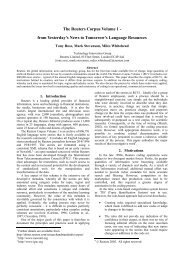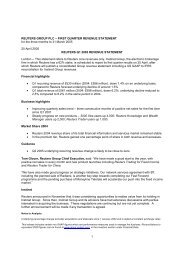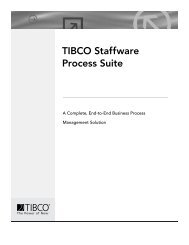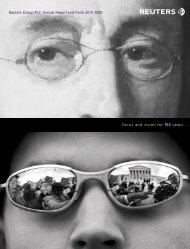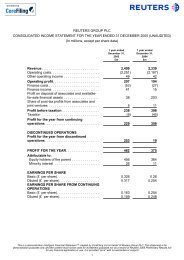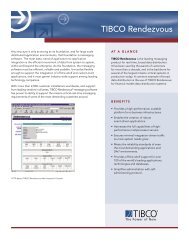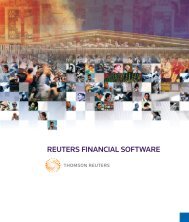REUTERS GROUP PLC ANNUAL REPORT AND ACCOUNTS 1999
REUTERS GROUP PLC ANNUAL REPORT AND ACCOUNTS 1999
REUTERS GROUP PLC ANNUAL REPORT AND ACCOUNTS 1999
You also want an ePaper? Increase the reach of your titles
YUMPU automatically turns print PDFs into web optimized ePapers that Google loves.
market value of the Greenhouse Fund.A different accounting treatment wasrequired under US GAAP to reflect theimpact of the capital reorganisation inFebruary 1998. Under US GAAP thistransaction was deemed to be a shareconsolidation combined with a specialdividend, and required retroactive restatementof earnings and dividends per share and perADS. Under UK GAAP no restatement ofearnings per share was deemed necessary asthe return of capital was considered to beequivalent to a repurchase of shares at marketvalue and the number of new shares inReuters Group <strong>PLC</strong> was set to facilitatecomparability with those of Reuters Holdings<strong>PLC</strong>.9. YEAR 2000 READINESS DISCLOSUREMillennium ProgrammeReuters established its MillenniumProgramme in 1996 to address the issuesarising as a result of the change ofmillennium and the fact that the year 2000 isalso a leap year.The first goal of the Programme was achievedwhen Reuters moved into the year 2000without any significant problems. It was notnecessary to invoke any of ReutersMillennium continuity plans over this period.The Millennium Programme involved therenovation of over 2,000 of Reutersproprietary software applications. More than27,000 applications that run on Reutersproduction systems and over 350,000applications on client site key stationsglobally were updated with millenniumversions.Year 2000 leap yearAlgorithms within some computerprogrammes may not detect that the year2000 is a leap year. Reuters MillenniumProgramme established procedures, includingreviewing software code and testingcomputer systems, which would address boththe millennium transition and the year 2000leap year.To manage this risk, Reuters will re-establishits millennium command centres with 24hour staffing which were deployed over themillennium transition period. Reuters willalso be prepared to invoke its millenniumbusiness continuity plans should these provenecessary.Incorrect processing of dates surrounding theyear 2000 leap year, either by Reutersproprietary computer systems or those ofthird parties, represents a residual businessrisk to Reuters.Expenditure for 2000 is budgeted atapproximately £4 million.Millennium Programme costsDetails of the costs incurred in <strong>1999</strong> are setout below:Costs£m <strong>1999</strong> 1998Internal effortDevelopment/testing 7 10Implementation 10 14External effortDevelopment/testing 12 18Implementation 13 13Total 42 55Expenditure for <strong>1999</strong> of £42 millioncompares with the budget of £28 millionreported in February <strong>1999</strong>. The increaseprincipally reflected additional expenditureon training, enhanced staff coverage over themillennium weekend and investment incontinuity planning at Instinet.Incremental capital expenditure arising as adirect result of the programme was £8 millionin <strong>1999</strong>. No estimation of the cost of assetsreplaced in the normal business cycle hasbeen made.Internal development effort in <strong>1999</strong> of £7million represented 4% of total groupdevelopment expenditure. The £10 million ofimplementation activity represented 5% ofclient site activity. Accordingly, Reutersbelieves that the Millennium Programme hasnot resulted in any material deferrals ofproduct developments or decreases in servicequality at client sites.We do not expect to incur any significantincremental external costs in 2000.10. CAUTIONARY STATEMENTSForward-looking statementsThis document contains certain forwardlookingstatements within the meaning of theUnited States Private Securities LitigationReform Act of 1995 with respect to Reutersfinancial condition, results of operations andbusiness and management’s strategy, plansand objectives for the company. Thesestatements involve risk and uncertaintybecause they relate to events and depend oncircumstances that will occur in the future.There are a number of factors that couldcause actual results and developments todiffer materially from those expressed orimplied by these forward-looking statements.These factors include, but are not limited to,changes in economic conditions, changes inregulatory policies, competition from otherinformation and financial services providers,technological or other developments affectingthe Internet, difficulties or delays by Reutersin developing new technology or softwareproducts and exposure to fluctuations incurrency exchange rates.Impact of currency movementsReuters reports results in UK pounds sterlingbut receives revenue and incurs expenses inmore than 70 currencies and is therebyexposed to the impact of fluctuations incurrency rates. The euro’s continuingweakness relative to the pound in <strong>1999</strong>restricted revenue and earnings growth in<strong>1999</strong>, and a continuation of the euro’sweakness could further restrict reportedrevenue and earnings in 2000. Reuterscurrency exposure is actively hedged. Foradditional information concerning currencyfluctuations see “Treasury Management” onpages 39–40.State of financial marketsReuters business is dependent upon thehealth of the financial markets and theparticipants in those markets. Reutersbusiness could also be adversely affected byconsolidations and rationalisations amongclients in the financial services and otherindustries.Reuters dealing products and Instinet areparticularly dependent upon the level ofactivity in the foreign exchange and equitymarkets respectively.Reuters Group <strong>PLC</strong> Annual Report <strong>1999</strong> 41



